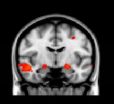(Press-News.org) PROVIDENCE, R.I. –Rhode Island Hospital researchers have completed a study that found regular use of fish oil supplements (FOS) was associated with a significant reduction in cognitive decline and brain atrophy in older adults. The study examined the relationship between FOS use during the Alzheimer's Disease Neuroimaging Initiative (ADNI) and indicators of cognitive decline. The findings are published online in advance of print in the journal Alzheimer's & Dementia.
"At least one person is diagnosed every minute with Alzheimer's disease (AD) and despite best efforts, we have not yet found a cure for this pervasive and debilitating disease," said principal investigator Lori Daiello, PharmD, of the Alzheimer's Disease and Memory Disorders Center at Rhode Island Hospital. "The field is currently engaged in numerous studies to find better treatments for people suffering with AD; however, researching ways to prevent AD or slow cognitive decline in normal aging is of utmost importance."
In this retrospective study, older adults involved in the ADNI study were assessed with neuropsychological tests and brain magnetic resonance imaging (MRI) every six months. The group included 229 older adults who were cognitively normal; 397 who were diagnosed with mild cognitive impairment; and 193 with AD.
The study found that fish oil supplement use during the study was associated with significantly lower rates of cognitive decline as measured by the Alzheimer's Disease Assessment Scale (ADAS-cog), and the Mini Mental State Exam (MMSE), but this benefit was observed only for the group of participants without dementia at the time of enrollment.
"Additionally, serial brain imaging conducted during this study showed that the participants with normal cognition who reported taking fish oil supplements demonstrated less brain shrinkage in key neurological areas, compared to those who did not use the supplements," Daiello said. "Also, the positive findings on cognitive testing and brain MRI were only observed in persons who did not carry the best-studied genetic risk factor for AD, APOE-4. More research is needed, but these findings are promising and highlight the need for future studies to expand the current knowledge of the effects of FOS use on cognitive aging and AD."
It is estimated that more than 5 million people in the U.S. have Alzheimer's disease. It is the most common form of dementia and is the sixth leading cause of death in the U.S.
INFORMATION:
This research was funded by from the Agency for HealthCare Research and Quality (AHRQ) (K08 HS017735); National Institute on Alcohol Abuse and Alcoholism (NIAAA) (R00AA020235, P01AA019072, and R01NS080655); National Cancer Institute (R03 CA153942, R01 CA155381); National Institute of Nursing Research (R01 NR011295); National Heart, Lung and Blood Institute (R01HL109116, R01 CA159954, 5T32HL076134, R01 HL064342); National Center for Complementary and Alternative Medicine (R01AT006948); National Institute on Drug Abuse (R01 DA021729, R34 DA031057); National Institute of Diabetes and Digestive Kidney Disorders (R18 DK075371); National Institutes of Health (R01 HL089311, U01 CA1503878; R34 DA031057-02, P01 AA019072, R01 NS036524, R01 HL084178, R01 DA020725, R56 DK075119, and R01 MH074368); and support from Pfizer; Janssen; Baxter, Eli Lilly and Avid pharmaceutical companies. Daiello's principal affiliation is Rhode Island Hospital, and she also holds academic appointments in the department of neurology (research) at The Warren Alpert Medical School of Brown University and Health Services, Policy & Practice in the Brown University School of Public Health. Other current and former Lifespan researchers involved in the study are Brian Ott, M.D (Rhode Island Hospital; Shira Dunsiger, Ph.D, of The Miriam Hospital, Assawin Gongvatana, Ph.D (University of California San Diego), and Ronald A. Cohen, Ph.D., (University of Florida).
About Rhode Island Hospital
Founded in 1863, Rhode Island Hospital in Providence, R.I., is a private, not-for-profit hospital and is the principal teaching hospital of The Warren Alpert Medical School of Brown University. A major trauma center for southeastern New England, the hospital is dedicated to being on the cutting edge of medicine and research. Last year, Rhode Island Hospital received more than $55 million in external research funding. It is also home to Hasbro Children's Hospital, the state's only facility dedicated to pediatric care. For more information on Rhode Island Hospital, visit http://www.rhodeislandhospital.org, follow us on Twitter @RIHospital or like us on Facebook http://www.facebook.com/rhodeislandhospitalpage.
Fish oil supplements reduce incidence of cognitive decline, may improve memory function
Alzheimer's disease affects more than 5 million each year in the US
2014-07-15
ELSE PRESS RELEASES FROM THIS DATE:
Brain responses to emotional images predict PTSD symptoms after Boston Marathon bombing
2014-07-15
The area of the brain that plays a primary role in emotional learning and the acquisition of fear – the amygdala – may hold the key to who is most vulnerable to post-traumatic stress disorder.
Researchers at the University of Washington, Boston Children's Hospital, Harvard Medical School and Boston University collaborated on a unique opportunity to study whether patterns of brain activity predict teenagers' response to a terrorist attack.
The team had already performed brain scans on Boston-area adolescents for a study on childhood trauma. Then in April 2013 two bombs ...
Study finds unintended consequences of raising state math, science graduation requirements
2014-07-15
WASHINGTON, D.C., July 15, 2014 ─ Raising state-mandated math and science course graduation requirements (CGRs) may increase high school dropout rates without a meaningful effect on college enrollment or degree attainment, according to new research published in Educational Researcher (ER), a peer-reviewed journal of the American Educational Research Association.
VIDEO: Co-authors Andrew D. Plunk and William F. Tate discuss key findings. https://www.youtube.com/watch?v=jwxh1gj-T1M&feature=youtu.be
"Intended and Unintended Effects of State-Mandated High School ...
BUSM study: Obesity may be impacted by stress
2014-07-15
Using experimental models, researchers at Boston University School of Medicine (BUSM) showed that adenosine, a metabolite released when the body is under stress or during an inflammatory response, stops the process of adipogenesis, when adipose (fat) stem cells differentiate into adult fat cells.
Previous studies have indicated adipogenesis plays a central role in maintaining healthy fat homeostasis by properly storing fat within cells so that it does not accumulate at high levels in the bloodstream. The current findings indicate that the body's response to stress, potentially ...
Team studies immune response of Asian elephants infected with a human disease
2014-07-15
CHAMPAIGN, Ill. — Mycobacterium tuberculosis, the organism that causes tuberculosis in humans, also afflicts Asian (and occasionally other) elephants. Diagnosing and treating elephants with TB is a challenge, however, as little is known about how their immune systems respond to the infection. A new study begins to address this knowledge gap, and offers new tools for detecting and monitoring TB in captive elephants.
The study, reported in the journal Tuberculosis, is the work of researchers at the University of Illinois Zoological Pathology Program (ZPP), a division of ...
Protein's 'hands' enable bacteria to establish infection, research finds
2014-07-15
MANHATTAN — When it comes to infecting humans and animals, bacteria need a helping hand.
Kansas State University biochemists have found the helping hand: groups of tiny protein loops on the surface of cells. These loops are similar to the fingers of a hand, and by observing seven individual loops on the surface of E. coli bacterial cells, the researchers found that the loops can open or close to grab iron in the environment.
"These structures are like small hands on the surface of bacterial cells," said Phillip Klebba, principal investigator and professor and head of ...
4 lessons for effective, efficient research in health care settings
2014-07-15
Thousands of studies take place every year in healthcare settings. A report published recently in the American Journal of Preventative Medicine describes how to do many of these studies more rapidly. By taking into account the real-world constraints of the systems in which providers deliver care and patients receive it, researchers can help speed results, cut costs, and increase chances that recommendations from their findings will be implemented.
The lessons come from the My Own Health Report project, a collaboration between seven research institutions with the goal ...
Mormon pioneer mortality rate calculated at 3.5 percent
2014-07-15
The final stanza of the Mormon pioneer anthem "Come, Come Ye Saints" directly confronts the prospect of dying on the trail: "And should we die, before our journey's through…"
Now new research shows that pioneer mortality rates were not much greater than national averages at the time.
This may come as a surprise to modern Mormon youth who've participated in handcart treks.
"The youth go out and learn that a lot of people died and they push the handcart and after three days they think they are practically dead," said retired historian Mel Bashore. "But most people traveled ...
Saltier intravenous fluids reduce complications from surgery
2014-07-15
(PHILADELPHIA) -- Adequate hydration via a saline drip is essential during surgery, but recent reports suggest that getting the balance of salt and water just right could have an important impact on patient recovery. In the largest study of its kind researchers at Thomas Jefferson University found that a slightly saltier intravenous drip (hypertonic saline), and lower total volume of fluid received, reduced the overall rate of complications by 25 percent after the complex Whipple surgery for pancreatic cancer.
"This relatively minor change in intravenous fluids has ...
Defects in fatty acid transport proteins linked to schizophrenia and autism
2014-07-15
Using diverse methodologies, neuroscientists from the RIKEN Brain Science Institute report that defects in Fatty Acid Binding Proteins (FABPs) may help to explain the pathology in some cases of schizophrenia and autism spectrum disorders. After identifying mutations in FABPs from patients, the group led by Senior Team Leader Takeo Yoshikawa determined that the genetic disruption of Fabps in mice mimics disease behaviors seen in patients. This work suggests that disruption of FABPs could be a common link underlying some forms of these two prevalent mental disorders.
Published ...
Smarter ads for smartphones: When they do and don't work
2014-07-15
NEW YORK — Brands spent $8.4 billion on mobile advertising in 2013, and that number is expected to quadruple to $36 billion by 2017, according to eMarketer. But do mobile display ads — those tiny banner ads that pop up in your smartphone's web browser — actually work? Researchers at Columbia Business School have found that, despite their size, mobile ads can have a big effect on consumers who are in the market for certain types of products.
"Digital advertising in mobile channels is experiencing explosive growth," said Miklos Sarvary, co-director of the Media Program ...
LAST 30 PRESS RELEASES:
A genetic brake that forms our muscles
CHEST announces first class of certified critical care advanced practice providers awarded CCAPP Designation
Jeonbuk National University researchers develop an innovative prussian-blue based electrode for effective and efficient cesium removal
Self-organization of cell-sized chiral rotating actin rings driven by a chiral myosin
Report: US history polarizes generations, but has potential to unite
Tiny bubbles, big breakthrough: Cracking cancer’s “fortress”
A biological material that becomes stronger when wet could replace plastics
Glacial feast: Seals caught closer to glaciers had fuller stomachs
Get the picture? High-tech, low-cost lens focuses on global consumer markets
Antimicrobial resistance in foodborne bacteria remains a public health concern in Europe
Safer batteries for storing energy at massive scale
How can you rescue a “kidnapped” robot? A new AI system helps the robot regain its sense of location in dynamic, ever-changing environments
Brainwaves of mothers and children synchronize when playing together – even in an acquired language
A holiday to better recovery
Cal Poly’s fifth Climate Solutions Now conference to take place Feb. 23-27
Mask-wearing during COVID-19 linked to reduced air pollution–triggered heart attack risk in Japan
Achieving cross-coupling reactions of fatty amide reduction radicals via iridium-photorelay catalysis and other strategies
Shorter may be sweeter: Study finds 15-second health ads can curb junk food cravings
Family relationships identified in Stone Age graves on Gotland
Effectiveness of exercise to ease osteoarthritis symptoms likely minimal and transient
Cost of copper must rise double to meet basic copper needs
A gel for wounds that won’t heal
Iron, carbon, and the art of toxic cleanup
Organic soil amendments work together to help sandy soils hold water longer, study finds
Hidden carbon in mangrove soils may play a larger role in climate regulation than previously thought
Weight-loss wonder pills prompt scrutiny of key ingredient
Nonprofit leader Diane Dodge to receive 2026 Penn Nursing Renfield Foundation Award for Global Women’s Health
Maternal smoking during pregnancy may be linked to higher blood pressure in children, NIH study finds
New Lund model aims to shorten the path to life-saving cell and gene therapies
Researchers create ultra-stretchable, liquid-repellent materials via laser ablation
[Press-News.org] Fish oil supplements reduce incidence of cognitive decline, may improve memory functionAlzheimer's disease affects more than 5 million each year in the US




